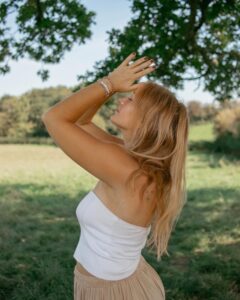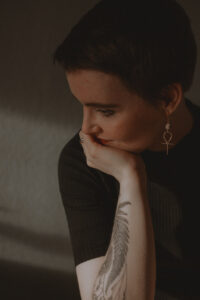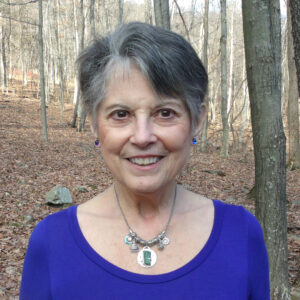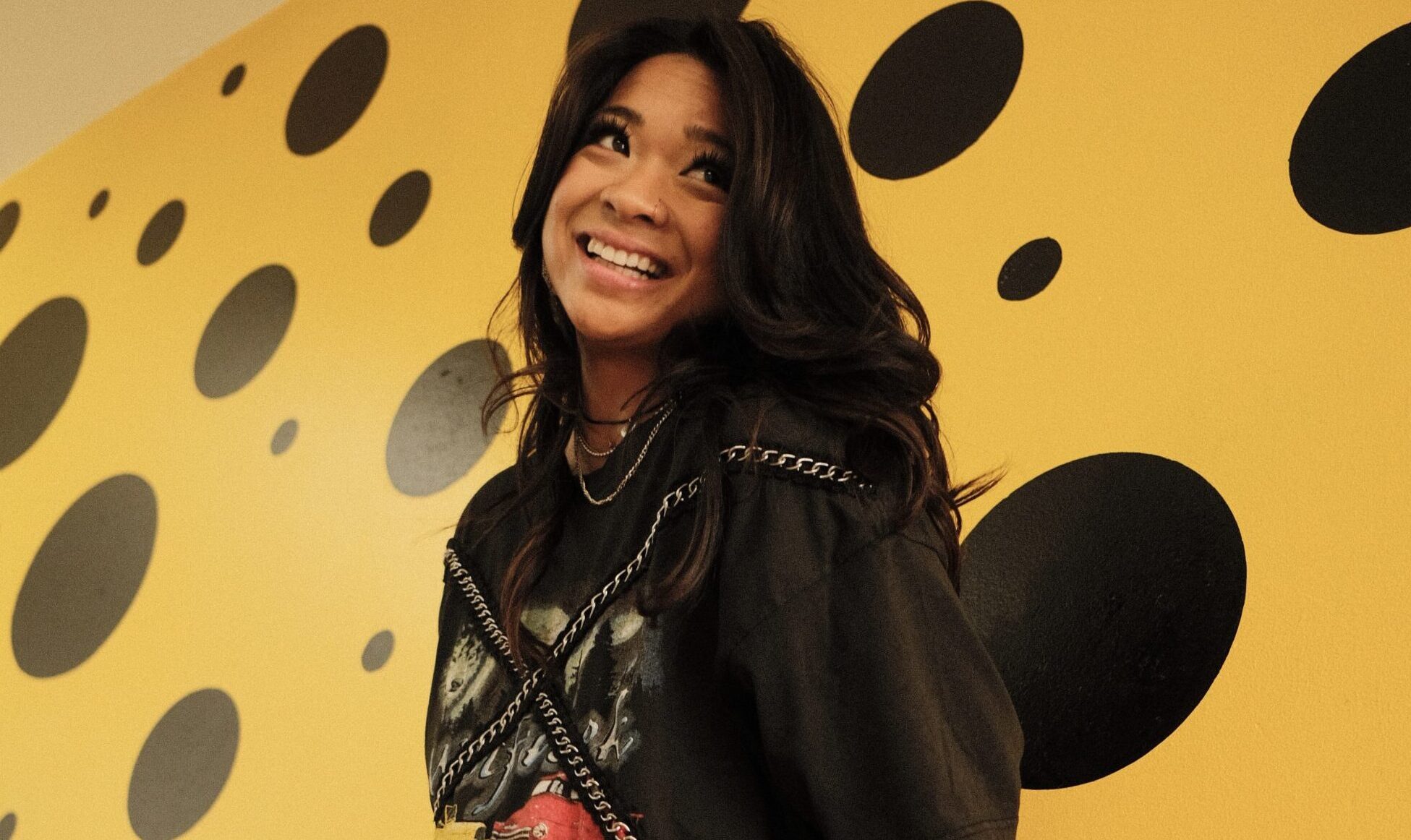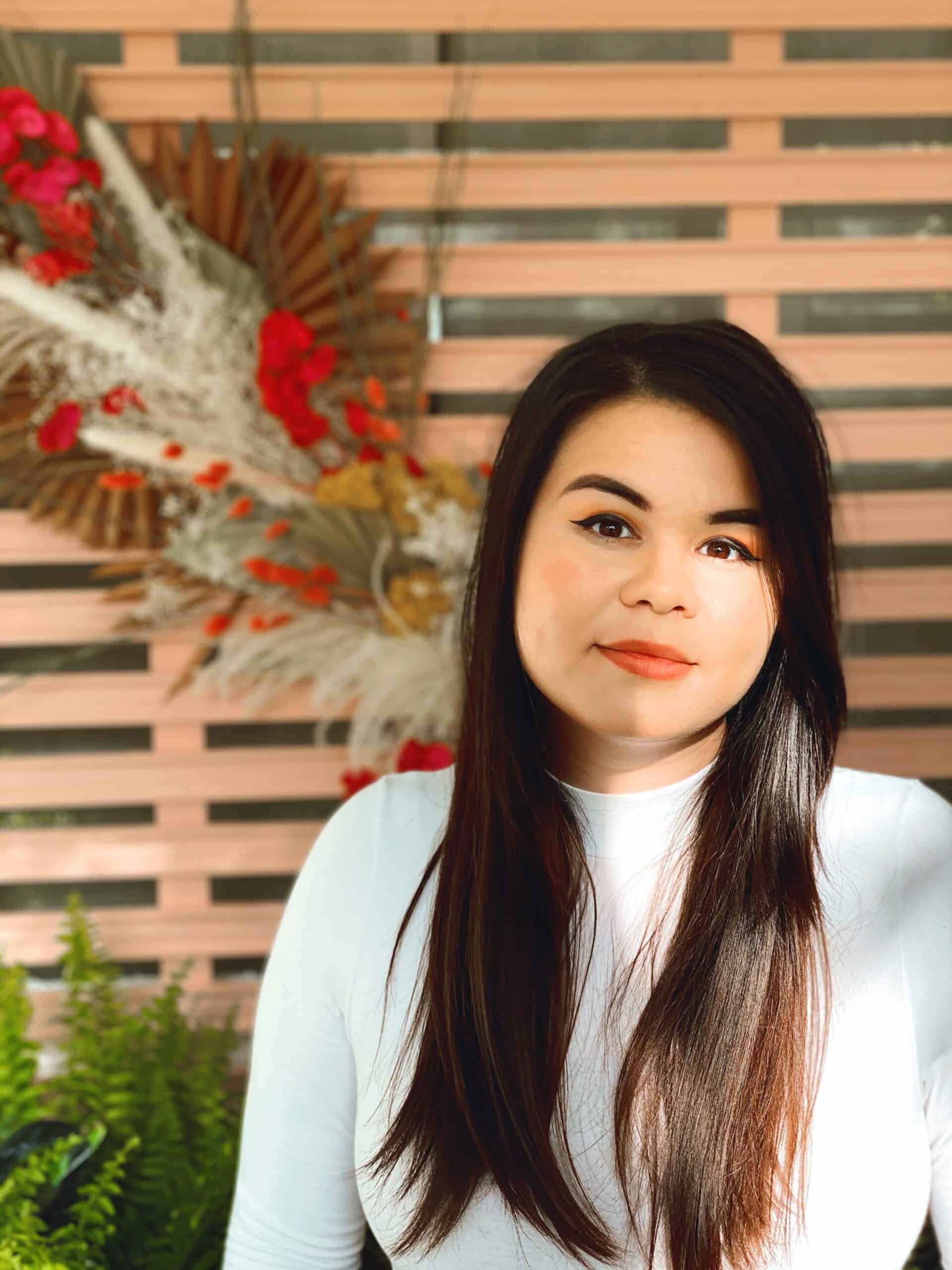Vivian Dang’s journey into poetry was unexpected but deeply transformative. What began as a private journaling exercise to process the emotions of a brief but intense romantic encounter soon blossomed into a powerful collection of poems. Through her work, In the Space Between, Vivian candidly explores the raw, unfiltered emotions of love, loss, and self-discovery. Her decision to share these vulnerable pieces with the world not only marked the beginning of her self-publishing journey but also served as a beacon of empowerment for others. Vivian’s story is a testament to the healing power of writing and the courage it takes to embrace vulnerability, both in life and in art.
What inspired you to write “in the space between” and share your personal experiences through poetry?
It was actually an accident.
I was deep in my emotions over a brief romantic encounter that ended, so I decided to journal – something I hadn’t done in years. I pulled out a dollar store notebook and started writing. The words and emotions that emerged were raw, unfiltered thoughts and emotions that I wanted to say to this particular person. It was meant to be texts that I wanted to send to them, but knew I never would.
As I continued to journal, the words that emerged sounded poetic. It was so cathartic, so I began composing poems about that experience.
I never intended to post these poems publicly – they were always meant to be private, a creative outlet to process my emotions. But that brief encounter taught me to take a chance and be vulnerable… so I decided to share my emotions publicly on my Instagram account.
When my friends saw my poems on Instagram, they encouraged me to write a poetry book. I laughed it off but after a while, I realized that this could be a foray into one of my passion projects – publishing a book. At the time, I had composed over 30 poems so I decided to take the plunge and self-publish through Amazon.
Can you share more about the romantic encounter that served as the foundation for your book?
It started with a coffee date and resulted in an unexpected, whirlwind romance. I developed strong feelings for this person and when it ended, I was left with a landslide of emotions that I didn’t know how to process.
We lived in different cities, so there was hesitation on my end to pursue it beyond the coffee date. I decided to take a chance and never expected to actually like this person, let alone spend all my solo travel time with him. When I decided to continue seeing him, I felt a sense of freedom that I’d never felt with dating. I realized how incredibly rewarding it can be to let yourself go and be vulnerable.
The day I was leaving, we both discussed trying to date long-distance. Clearly, it didn’t work – and this became the basis of my book.
How do the four seasons symbolize the different phases of a romantic relationship in your poems?
“He made me feel like it was summer in autumn” – this was a phrase that came up repeatedly on our first date. It was an unusually warm autumn day and there was something so magical in the air. For me, the summer aspect was very vivid in my mind and I wanted to capture that feeling. It was actually the first poem that I wrote called “eternal summer” and it embodied the carefree feeling I felt when I was with him.
When it ended a few weeks after I returned home, I was hit with a wave of grief and sadness. I noticed how happy and infatuated I was while we were together and the stark contrast in my poems when we decided to end things.
It made me reflect on the stages of a romantic relationship and using the four seasons to symbolize it – summer, the excitement//honeymoon stage; autumn, the sadness when a relationship ends; winter, the anger and bitterness that hits when you finally process your emotions; then the arrival of spring, where you feel hopeful again. It’s very much cyclical.
This didn’t come together until I finished writing my poems and somehow, it just tied everything together. The poems illustrated my journey of romance through modern dating, the insecurities that I uncovered about myself and how I process these complex emotions when a relationship ends – and when it begins again.
What was the most challenging aspect of writing such a deeply personal and vulnerable collection of poems?
An attack on my self-worth. The people you date, your relationships… they’re all a mirror to your deepest insecurities. There was a sense of pride I felt in revealing just how hurt I felt when he ended things with me. It sounds silly, but I’ve learned how easy it is to be your worst critic.
The rejection and hurt I felt opened up a floodgate of emotions I didn’t really want to face or admit about my self-worth – it impacted the way I saw myself and my own internal belief system about love and dating. I remember thinking to myself, “am I unlovable?”.
It all emerged as a rude awakening as I continued to write these poems. But I appreciate that it also helped me confront these insecurities and challenge my unhealthy thoughts about myself.
How has the process of writing and publishing this book impacted your mental health?
Imposter syndrome emerged and this book almost didn’t happen, because I compared myself to other well-known poets. I actually talked myself out of publishing the book many times before I finally went through with it.
I felt insecure publishing poems about a guy I was hung up on and told myself, “who would actually want to read this? Would people even buy the book?”
At first, it was really difficult. But I’m grateful for how cathartic and healing this process has been. Aside from the sadness I felt at the time, it also forced me to face a lot of my insecurities head-on.
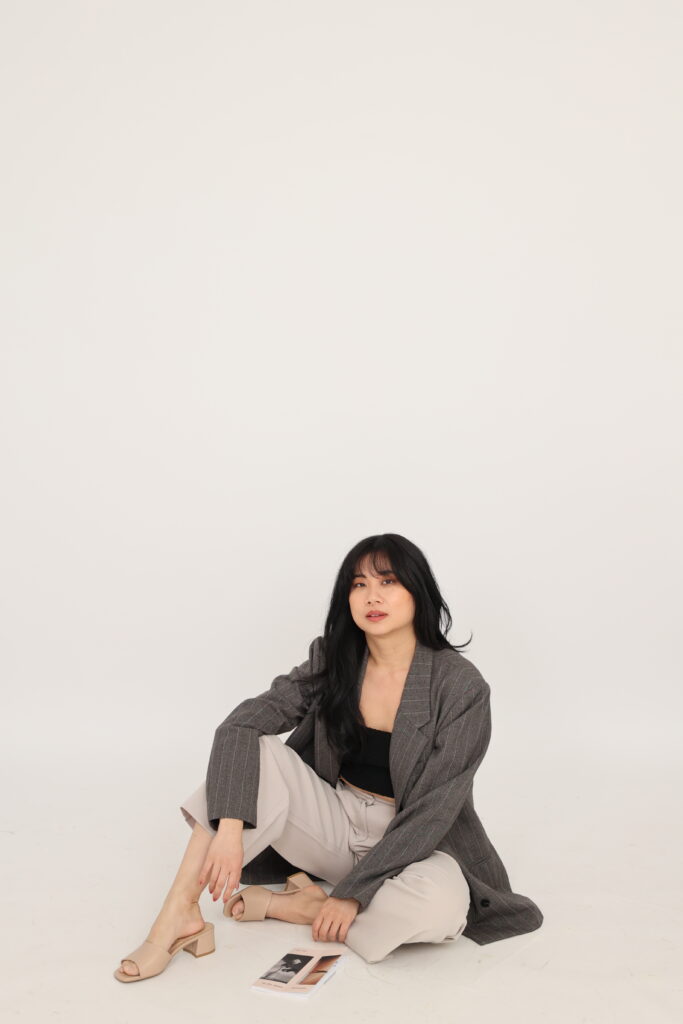
How has modern dating influenced your perspective on love, and how is that reflected in your poetry?
With dating apps specifically, I became increasingly cynical and pessimistic about love. I gave up many times and went on what my girlfriends call, a “heart sabbatical” during the 10 years I was on/off the apps. There’s tons of articles lately around gamification, horrible algorithms and corporate greed with dating apps. I’m not surprised.
It feels dehumanizing to post photos of yourself in an attempt to “sell” yourself to a potential match. And when you don’t get any quality matches or realize they wasted your time, you look inward and choose to blame yourself instead.
For women, in particular, we’re so hard on ourselves because of double standards and unrealistic societal and cultural expectations – the way we’re supposed to speak, how we act (which is never needy or desperate). So the mounting pressure becomes even more stressful, when we have to sift through who is actually genuine about a long-term commitment, and who’s only in it for a quickie (pun intended).
I was exhausted and frustrated by all of this and falling victim to societal expectations of women to just “be cool” or “act unbothered.”
So I told myself, why not just be brutally honest in my poetry? I challenged myself to be unapologetically raw and not edit my emotions – after all, why should I?
I wrote “desperation” to capture the vulnerable emotions I felt after being rejected by this person. When I published this poem through paid advertising on Instagram, I was shocked to see the number of men (85.5%!) compared to women that the poem ended up reaching. I guess it resonated more with men.
What advice would you give to others who are hesitant to share their personal stories or emotions in their creative work?
I would encourage others to lean into that discomfort. It’s obviously scary and anxiety-inducing, but there’s something so empowering and healing about sharing your personal stories and emotions. You may not realize it, but there’s actually a lot of people out there – strangers, acquaintances, friends – who feel seen and validated when they come across a story or poem that captures exactly what they’re going through.
I’m always surprised when people comment on my posts or message me to let me know that they resonated with a particular poem I wrote. The undeniable power of writing is its ability to connect anyone and everyone – regardless of who they are.
How do you stay inspired and continue to find new material for your poetry?
When men disappoint me – just kidding. I try not to place pressure on myself to constantly churn out content and remind myself that I can write simply when I feel like it.
After publishing “in the space between”, I was on a creative high and felt a bit of pressure to write all the time. I actually met someone in November and we were in a relationship for a few months – that’s when I found it a bit challenging to write poems. Mostly because I was incredibly happy! It made me realize that I write my best when I’m sad or angry (or both). So the pressure started to build.
When we broke up, I realized that I’m often inspired by big emotions. Or when I need to get something off my chest. Lately, it’s been about societal pressures in your 30’s and not reaching so-called milestones, as well as single shame.
What does vulnerability mean to you, and how has it shaped your work?
Vulnerability means being your true, unapologetic self and letting someone see you for you are – and allowing them to either accept you or walk away. Which makes it super scary.
I’ve always thought I was vulnerable in dating and relationship. I learned, through my romantic encounter, that I’ve actually hid my emotions, for fear of being seen as “too much” – too needy, too emotional, too desperate. When I had my romantic encounter, I was myself – and it felt different and empowering.
“in the space between” forced me to do just that. It’s the first time I’ve been honest about my emotions towards someone – and allowed people in my life to see this side of me. I wanted people to understand exactly who Vivian is and not waver because I’m afraid of being judged.
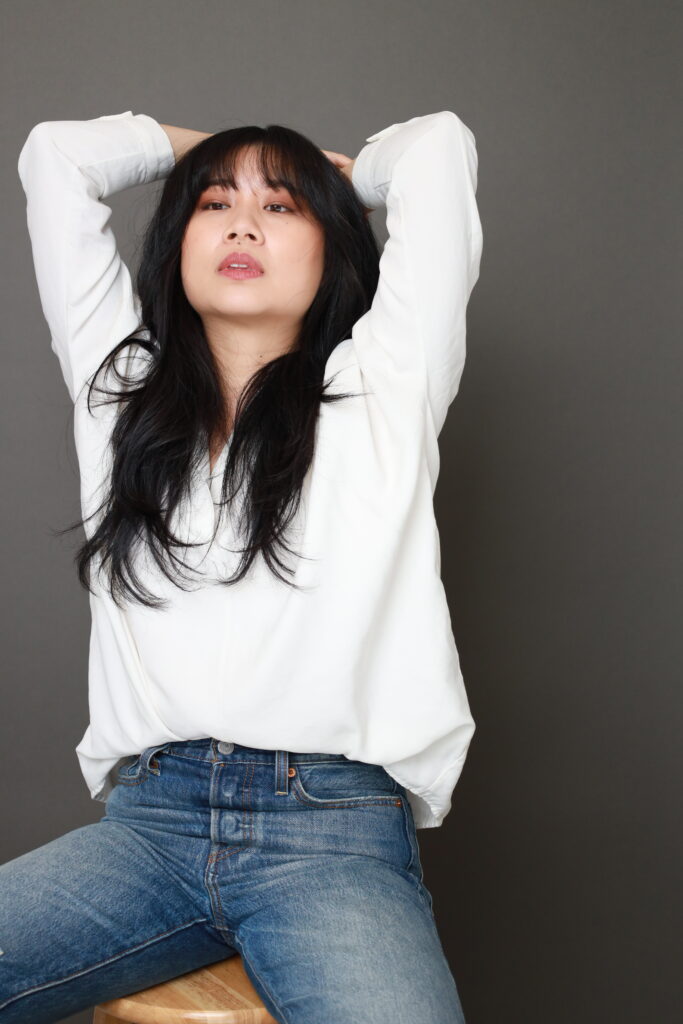
How do you hope “in the space between” will resonate with readers, particularly women?
I hope it empowers readers to be vulnerable – not just in relationships, but with themselves because that’s where it starts.
Most importantly, I hope my poems encourage women to feel seen and know that it’s always okay to feel complex emotions. As women, we’re always dismissed for being “too emotional” or “hormonal” and overlooked for being, well, human. And I’m so exhausted by this. We should honour and uplift each other in our shared experiences.
Patriarchy is a huge factor in the gender roles that (cis-gender) women are confined to and I want to challenge these sexist double standards, by being unapologetically honest in my emotions.
I have emotions, we all have emotions – so what? Isn’t that what makes us human?
What has been the most rewarding part of your self-publishing journey so far?
Having the opportunity to publish my first-ever book and not worry about it being edited in a certain way. Publishing can be so daunting, especially when you’re just starting out, so I’m incredibly grateful for how accessible Amazon made my self-publishing journey.
I remember having mentors growing up who encouraged me to write and recognized that I had a talent for it. You have a strong career in writing and we know you’ll do great things with it, they’d tell me. I never thought much of this until the last few years. I’m forever grateful to these mentors for always pushing me to write.
Self-publishing truly made my dream come true. Something I never thought would be possible.
How do you balance the demands of self-publishing with maintaining your well-being?
I initially placed a lot of pressure on myself to write a new poem everyday or every week. I quickly became stressed and found myself obsessed with how many people saw my poetry, liked it or shared it. The impact on my well-being simply wasn’t worth it.
I realized this pressure came from external factors and the desire to gain followers as a way to validate that I was a great poet. I’ve reminded myself since publishing “in the space between”, that this is my personal journey and I can write whenever I want to.
I’ve also asked myself, “who and what am I doing this for?” If I’m doing it for popularity and fame, I’m doing it for the wrong reasons. I write because it’s my passion – not for other people.
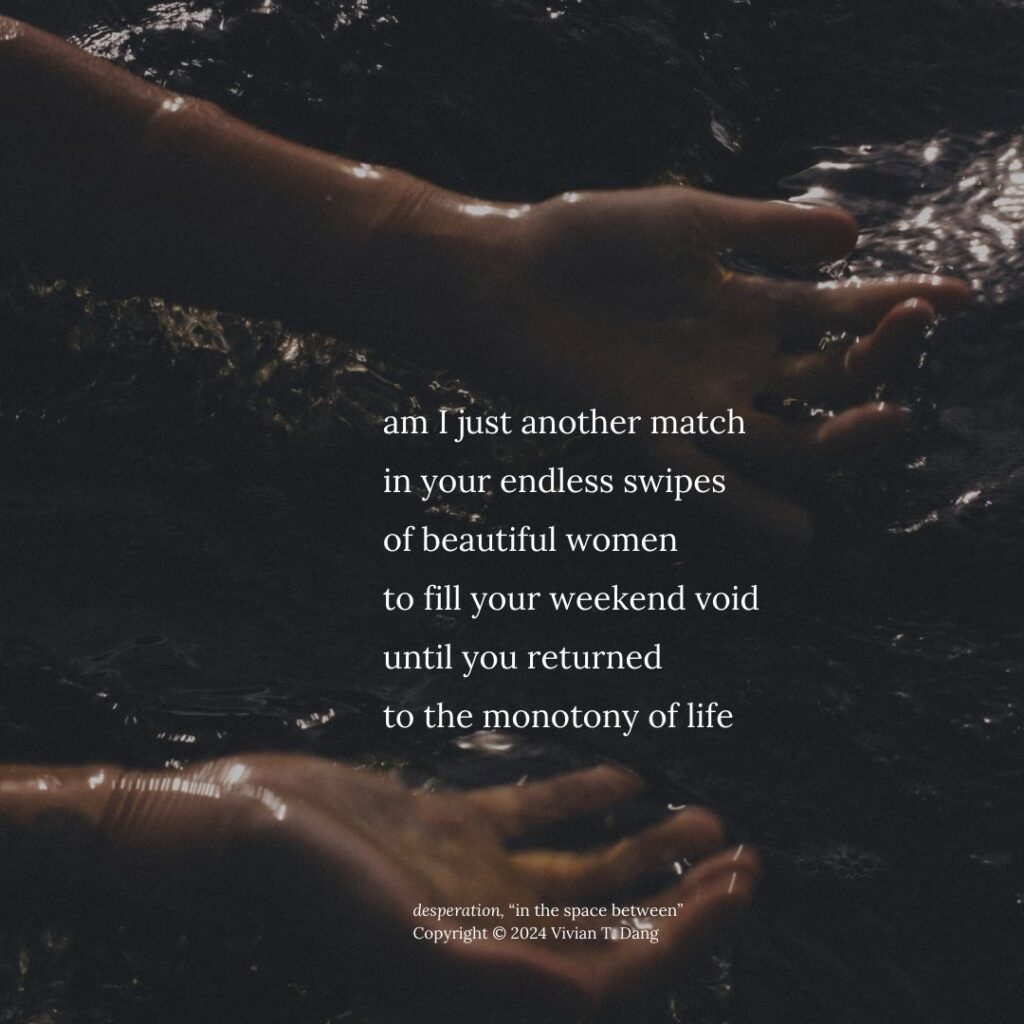
What advice would you offer to other women who are considering self-publishing their own work?
To do it! It’s a low barrier and accessible way to get your writing out there, without having to be represented by a publishing agency. You can control how you want to market your book and having this flexibility has been one of the best experiences for me.
The great part about self-publishing through Amazon is that you can edit and customize how your Amazon listing looks like. It’s a wonderful learning experience and it gives you a taste of whether you want to continue publishing more books.
Overall, it’s such a great way to see your name publicly and professionally printed in a book. It’s definitely a milestone worth celebrating!
Order Vivian’s debut poetry book on Amazon today.
IG: @vivianisviv
Substack: https://viviantdang.substack.com/

